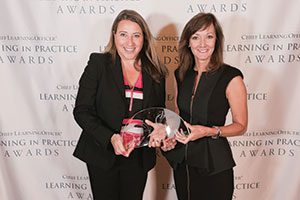Learning in Practice Awards 2016
Recognizes vendors that have rolled out an innovative and effective e-learning program or suite for a client.
GP Strategies 
Identity theft is just bad. Having bank account information stolen by hackers or dealing with other mischief from cyber thieves can be a pain to deal with too. Knowing the seriousness of such attacks, MasterCard set out to decrease the percentage of employees opening up phishing emails from the industry standard of 24 percent down to 15 percent. Phishing emails are meant to look real, but if opened they leave corporations open to hackers and compromise client information.

MasterCard wanted to build employees’ cyber acumen, to increase their vigilance in identifying and reporting all malicious phishing attacks. So global talent development team members partnered with GP Strategies to design and develop a simulated phishing experience — an intentional, extremely realistic scare tactic. The simulation would help employees identify phishing emails, pinpoint cues that might lead to bad emails, learn the impact of clicking on phishing emails and learn the correct steps to deal with them.
The experience mimicked a hacker stealing data directly from the user’s machine and walked employees through proper protocols. With collaboration from all partners, MasterCard began with 25 percent of the company, chosen at random, and eventually was able to distribute the simulation to its entire business unit.
The results were greater than expected. Instead of decreasing the industry standard to 15 percent, the company only had one third of the expected program failure rate. Now, more MasterCard employees can clearly understand how to avoid dangerous phishing emails and can comply appropriately to the company’s reporting and email isolation procedures.
—Nicholaus Garcia
GP Strategies 
It’s tough to navigate in the midst of continuous change, and it gets even tougher if the employees in a particular business don’t actually understand what’s changing.
At Lowe’s, change happens on a daily basis. Employees have to not only recognize technical changes, they have to stay abreast of changing processes and people as well. The popular home improvement retailer needed a set of tools to actively coach and guide its teams on changes impacting multiple departments. To help its 23,000 employees learn how to adapt, the company partnered with GP Strategies to develop a series of interactive, online experiences to coach employees and leaders through changes they experience daily.
Finding the best method to meet the geographically dispersed employee base, GP Strategies created a suite of level 2 and 3 online experiences to provide employees and leaders with the flexibility needed to use the training tools. The resulting learning program had an impact on Lowe’s corporate office, call centers, distribution centers and store locations, helping to increase resilience, manage resistance and build commitment to changes impacting multiple teams in different parts of the business.
—Nicholaus Garcia
Aptara
Philips Healthcare needed competent employees to do MRI installations. So the organization partnered with Aptara to design the IPM assessment game. The game not only assesses employees on different topics covered during training sessions, it helps to increase their confidence on the job. Philips was able to assess and monitor 400 employees and increase the efficacy and efficiency of the training program.
—Nicholaus Garcia














